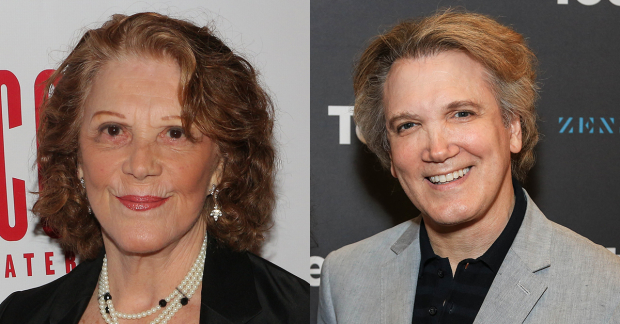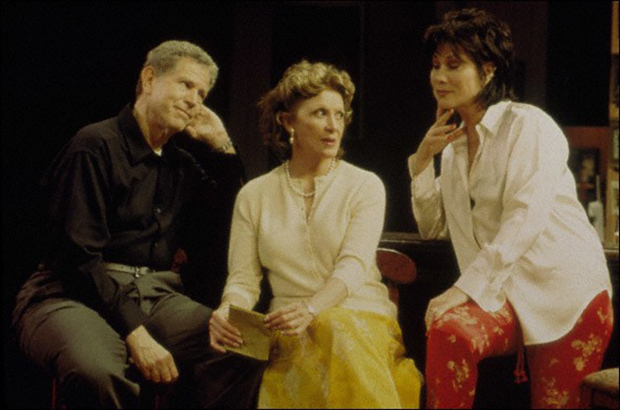Charles Busch and Linda Lavin Retell The Tale of the Allergist's Wife
"I have this little fantasy," Charles Busch says, "that when I'm on 48th Street, the marquee of the Barrymore Theatre says, ' The Tale of the Allergist's Wife, now in its 20th record-breaking year! Longest-running play in the history of Broadway!'"
Allergist's Wife, which opened off-Broadway in 2000, transferred to the Barrymore later that year, and subsequently ran for 777 performances, marked Busch's Broadway debut as a playwright. It also marked the first time in his career that he didn't play his own leading lady.
That task went to Tony winner Linda Lavin, who would earn another nomination for playing Marjorie Taub, a member of New York City's Upper West Side elite whose dissatisfaction with her current lot in life is changed by the arrival of her colorful long-lost friend Lee.
Lavin has gathered the original company — which also includes Michele Lee as Lee, Tony Roberts as Marjorie's husband, and Anil Kumar as their doorman — for a one-night reading of the play benefiting the Actors Fund on November 18. Lynne Meadow will return to direct. This time, though, Lavin will graduate to the role of Marjorie's cantankerous mother Freida, originally played by the late Shirl Bernheim, and Busch will, for the first time in the play's history, assume the role of Marjorie.
In anticipation of the event, Busch and Lavin reminisced about the original production and what this one-night revival will have to offer.

(© David Gordon; Tricia Baron)
Charles, how did you come to cast Linda as Marjorie originally?
Charles Busch: I had seen Linda in the play Death Defying Acts as I was starting to write Allergist's Wife, so I had her in my mind and heard her voice the whole time. Lynne Meadow asked who my fantasy actress to play Marjorie was, and I said Linda Lavin, so we got her.
Linda Lavin: Charles stalked me, and I ran away from him for a year. I loved the script and I loved the role, but I knew it was gonna kill me. It's like Mama Rose. There are roles in the theater where you think, "If I survive this, I can do anything," and this is one of them. We had a wonderful reading, and hilarious as the play was, I said, "Thank you for the opportunity, but I never want to work this hard again." I went back to California and I was in a coffee shop and there was Charles with his script. He asked me to read it again. It's such a brilliant piece of writing. Marjorie spoke to pieces of me that I wanted to express through what he had written. So I said, "Oh, OK."
Linda, how did you come to cast Charles now?
Linda: My husband and I had our own theater [the Red Barn Studio Theatre] in Wilmington, North Carolina, and we had done Allergist's Wife in 2009 and I played the mother, Freida. I wanted to do something for the Actors Fund, so we hit on Allergist's Wife, with Charles playing Marjorie and me playing Freida again. I called Charles and he said, "Absolutely!"
Charles: I was shocked. Linda looks so fantastic that she could do the play now, so I assumed she was going to do her part. I had never really thought about playing Marjorie, because it's not like the female characters that I usually play. But for one night, I'm game to try it.

(© Joan Marcus)
What makes Marjorie such a hard role?
Charles: You have to have enormous comic skills, but also be a grounded dramatic actress and have a sense of authenticity in that New York milieu. One of the things that was so great about the original production was the authenticity. They were all New York actors.
Linda: It's the physicality of her. She starts to break down in a violently emotional way. She's been so traumatized by her own feelings of not being enough and not having any life. One thing after another builds into her lack of self-esteem until she finally blows. And then there's the comedy and the anger that comes out of the fear that she's losing her mind. It's as if Lady Macbeth were a comic character. It takes a lot out of you to create it, and then to play it eight times a week.
These two roles — Marjorie and Freida — are so associated with their original portrayers, Linda and the late Shirl Bernheim. How do you both feel about taking them on now?
Charles: Linda's performance is so indelibly etched in my brain, and she said everything exactly like I dreamed. From the very beginning, she gave the play such a gravitas and emotional truth. And she's a brilliant comic actress. She's surgical in her precision in how to get a laugh. It's my specialty, as I call it, that I can evoke an actress without actually imitating her, if that makes sense. I hear it in my brain and I somehow channel it. In my other plays, I tend to evoke Rosalind Russell or Greer Garson. This time, it's Linda Lavin.
Linda: Shirl was adorable and very influential to me. When I did it at the Red Barn, it was very much like I was imitating her. I could hear her voice, and my version of that voice came out of me. Freida is extremely self-centered. She can really spin an expression that can be very hurtful, and she's completely inappropriate and embarrassing and a constant nightmare. She's a helluva lot of fun to play, and I'm really looking forward to doing that with Charles and Tony and Michele and Anil.











